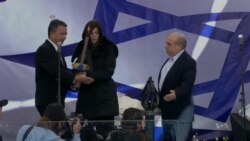French lawmakers agreed to extend the country's participation in airstrikes against Islamic State militants in Iraq, a week after three men who claimed allegiance to extreme Islamist groups killed 17 people in Paris.
Speaking to the National Assembly ahead of the vote on Tuesday, French Prime Minister Manuel Valls said France is at war against extremists, not religion.
"Yes, France is at war against terrorism, jihadism, and radical Islamism," Valls said.
"France is not at war against a religion. France is not at war against Islam and Muslims. France will -- and the president of the Republic has also reminded us of this this morning -- France will always protect, as it always did, all its fellow citizens," he added.
Later Tuesday the lower house of parliament approved extending French airstrikes against the Islamic State group in Iraq, as a member of the U.S.-led coalition against the militants who overran large parts of Syria and Iraq in the last year.
The head of Europe's police organization, Europol, on Tuesday said that as many as 5,000 Europeans have joined fighting in Syria, raising concerns about mercenaries returning to their home countries to carry out terror attacks.
Funerals held
Earlier, families and colleagues of three French police officers killed in last week's terror attacks in Paris paid their final respects Tuesday.
French President Francois Hollande stood before the flag-draped coffins and praised their heroism, granting the officers posthumously the nation's prestigious Legion of Honor award.
"Thanks to them, thanks to you, freedom won over barbarism. And it is the people of France who stood up to express its attachment to living together, in harmony and fraternity, in front of the leaders of the whole world," Hollande said.
"Thanks to you, with you, France is standing. Long live the Republic. Long live France," he said.
Funerals were also held in Jerusalem for four Jewish victims of last week's terror spree.
'Incubator for radicalization'
EU anti-terror chief Gilles de Kerchove told the French news agency AFP that completely preventing future attacks like the Paris massacre is impossible.
De Kerchove also warned that prisons "are a massive incubator for radicalization."
Bulgarian authorities on Tuesday confirmed the arrest of Fritz-Joly Joachin, a French citizen wanted on terrorism-related and kidnapping charges.
Police in France allege the 29-year-old had contact with at least one of last week's attackers. Bulgaria is considering his extradition to France.
Two brothers, Cherif and Said Kouachi, killed 12 people at the offices of satirical weekly newspaper Charlie Hebdo. The publication is known for cartoons that poke fun at Islam and other religions, as well as public figures.
Editorial staff at Charlie Hebdo are defending their latest issue.
The cover of the magazine being released Wednesday shows a weeping Prophet Muhammad holding a sign saying "I am Charlie." He is standing under a caption that reads "All is forgiven."
Watch related video from VOA's Zlatica Hoke:
Charlie Hebdo to publish
Editor in chief Gérard Biard told news agency France Info the cartoon by Renald Luzier, known by the pen name "Luz," was not meant to be read as Muhammad offering forgiveness.
"It is we who forgive, not Muhammad,” Biard told France Info. But he said he has yet to pardon the attackers.
"We asked ourselves how we could still be us, how we could keep laughing, with a front page about an event that hit us so hard?" Biard told France Info.
Luzier repeatedly broke down in tears Tuesday during a press conference in Paris as he described drawing the cartoon.
"It was not the front page the world wanted us to make, but it was the one that we wanted to make. It was not the front page the terrorists wanted us to make, because there are no terrorists in it, there is just a guy crying," he said.
The publishers of the first post-terror attack issue of the magazine say they plan to print at least 3 million copies. Charlie Hebdo usually prints about 60,000 copies per week.
French police killed the Kouachi brothers Friday, the same day another Islamic militant, Amedy Coulibaly, killed the four Jewish victims at the kosher supermarket in eastern Paris before being killed by police. Coulibaly had killed a French policewoman one day earlier.
Authorities say France remains at high risk for terrorism and is deploying 10,000 troops to help police with security at so-called "sensitive sites." Those include Jewish schools, synagogues and mosques.
French police are seeking Coulibaly's girlfriend, Hayat Boumeddiene. Police initially thought she was in the supermarket. But a Turkish news agency has aired security camera footage from an Istanbul airport appearing to show Boumeddiene entering the country on January 2.
Turkish officials believe she now may be in Syria.
VOA's William Gallo contributed to this report.








